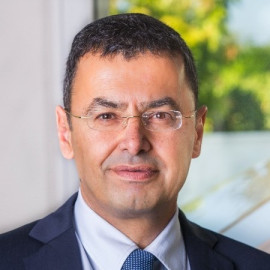Guest post by Phillip Fine, Jerusalem-based writer/editor.
There’s commercialization of military know-how and then there’s Israel’s commercialization of military know-how.
Take mPrest Systems Inc., a software maker headquartered in Petah Tikva, a city of 231,000 roughly 11 kilometres east of Tel Aviv.
That company is selling the software that Israel used in Iron Dome – its system for shooting down Hamas rockets — to electric power utilities to help them prevent blackouts.
Specifically, by polling sensors, the software allows an electric utility to monitor its equipment. The utility can then better predict when a transformer might pop, thus allowing for repairs before the electricity goes off.
One customer, the New York Power Authority, has already used the software to pinpoint transformers that it didn’t even know were problematic, says Natan Barak, mPrest’s CEO, who spoke to Media Line at the OurCrowd global investor summit in Jerusalem Feb. 16.

mPrest CEO, Natan Barak
mPrest hopes to sell the software to other electric utilities in the U.S., as well as to power companies in Asia.
In fact, the company is customizing its product so utilities in that part of the world can better match power generation with power consumption, thereby reducing the possibility of outages and blackouts.
All told, mPrest’s software helps electric utilities tie together their many moving parts, such as sensors, closed circuit TV cameras, alarms, fences and patrol vehicles.
Indeed, the product can connect more than 300 sites, five levels of hierarchy, as well as tens of thousands of sensors.
But what about Israel’s security? Isn’t it endangered by the sale of Iron Dome software?
After all, from 2011 to 2014, Iron Dome reportedly intercepted more than 1,200 rockets that Hamas fired from Gaza. And many of those rockets would have hit populated areas. Moreover, Israel hopes to make Iron Dome even more useful, extending its range to 250 from 70 kilometres, as well as tweaking it so that it can simultaneously intercept rockets coming from two directions.
But Israelis needn’t worry that their enemies might gain the upper hand. Because mPrest’s software uses only Iron Dome’s infrastructure, and not its operational capabilities, there’s no security risk, says Mr. Barak.
In the meantime, mPrest sees its software helping power the so-called smart city: those systems that use sensors to knit together the many layers of communication in a complex urban area.
Take a tree that falls on a homeowner’s driveway or front lawn during a blizzard or an ice storm. Thanks to mPrest’s software, the homeowner need only push a button on his android, rather than phone city hall, to report the problem, Mr. Barak says.
mPrest has already sold this type of software to Bezeq, the Israeli phone company, which in turn will license the product to cities throughout Israel. mPrest also hopes to sell the software to telcos in other parts of the world.
Yet another customer for mPrest’s product will be Netafim, the Israeli maker of drip and micro-irrigation products for both the agriculture and greenhouse sectors.
Through the use of ground-based sensors, an irrigation company will be able to use the software to measure out the right amount of water at the right time and at the right place.
Mr. Barak, now 58, is perhaps the perfect person to bridge the gap between software used in defence and software used in business.
Not only does he hold a B.Sc in electrical engineering from the Technion, Israel’s version of the Massachusetts Institute of Technology, but he also holds an MBA from Bar-Ilan University in Ramat Gan near Tel Aviv. In addition, he has a master’s degree in political science from the University of Haifa.
More important, he spent 23 years in the Israeli navy, during which he helped develop command and control systems for the country’s submarines, missile boats and helicopters. He also helped develop a simulator for subs.
Founded in December 2003, mPrest now boasts 180 full-time employees, of which 160 are either engineers or specialists in mathematical algorithms.
Although private, the company is likely to go public in a few years, Mr. Barak says.
mPrest Systems is an OurCrowd portfolio company; to learn more about the investment, visit ourcrowd.com.








